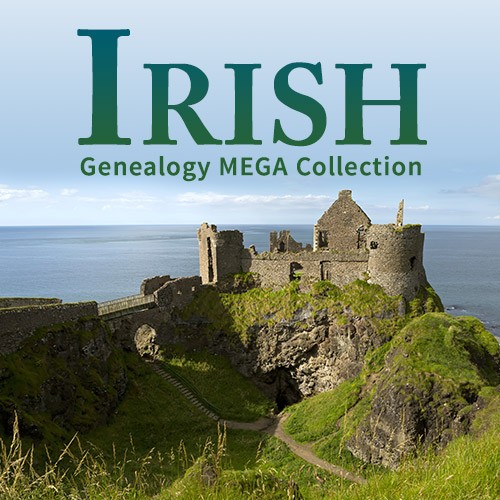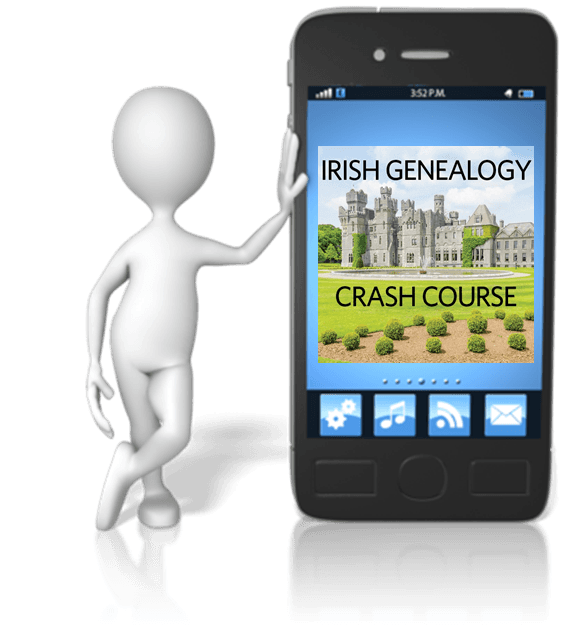by Lisa Cooke | Mar 23, 2016 | 01 What's New
This multimedia kit is a comprehensive and exciting way to learn to trace your Irish genealogy. Priced at just for EVERYTHING, you save nearly 0 on retail for a limited  time, it’s a lucky deal, if I ever saw one!
time, it’s a lucky deal, if I ever saw one!
Tracing your Irish roots takes a bit of luck and a lot of patience. But the payoff for those who persist can be huge. The Irish have a rich history and culture that descendants love to embrace. And it’s getting more exciting to be an online Irish researcher, with important new Irish records coming online frequently.
One of the biggest Irish genealogy challenges is the destruction of the Public Records Office during the Irish Civil War. But while many records were lost, there are plenty of ways to find information on your ancestors.
Even better, during March Family Tree Magazine has slashed the price of its Irish Genealogy MEGA Collection. This comprehensive multimedia collection is a family historian’s pot of gold, packed with everything from tips on breaking down your Irish brick walls to finding vital and census records, immigration forms, and a thorough list of useful websites. Plus, you’ll get the historical background that drove emigration and affected your ancestors’ lives – as well as your research.
Here are the incredible tools you will get:
- EIGHT on-demand webinars on different aspects of Irish research
- A full-length e-book, A Genealogist’s Guide to Tracing Your Irish Ancestors
- A digital cheat sheet and an overview article for quick reference.
I love this multimedia kit because you can read, watch and learn at your own pace. The digital  format means you can put the entire kit on your favorite mobile device. That lets you learn on-the-go and consult your reference library while you’re out researching. Of course you can use these materials on your home computer, too. The choice is yours–and with the limited-time price on this mega kit, the fabled luck of the Irish is yours, too!
format means you can put the entire kit on your favorite mobile device. That lets you learn on-the-go and consult your reference library while you’re out researching. Of course you can use these materials on your home computer, too. The choice is yours–and with the limited-time price on this mega kit, the fabled luck of the Irish is yours, too!
More Irish Genealogy Gems
by Lisa Cooke | Mar 18, 2016 | 01 What's New, Records & databases
Here’s our weekly roundup of interesting and new genealogy records online for Brazil, Denmark, England, Ireland and the U.S.
BRAZIL CIVIL REGISTRATIONS. Over 200,000 indexed records have been added to a free collection of Pernambuco, Brazil civil registrations (1804-2014) at FamilySearch.org.
DENMARK DEEDS AND MORTGAGES. FamilySearch.org has added nearly 3 million digitized images to its collection of browsable deeds and mortgages for South Jutland, Denmark (1572-1928).
ENGLAND COURT. Ancestry subscribers now have access to a new collection of Yorkshire, England, Quarter Session Records, 1637-1914 (1637-1914). According to the database description, these courts “had both a civil and a criminal jurisdiction, and before 1888 they also had an administrative function. Civil cases usually appear in the court’s order books and criminal cases in the indictment books.”
(1637-1914). According to the database description, these courts “had both a civil and a criminal jurisdiction, and before 1888 they also had an administrative function. Civil cases usually appear in the court’s order books and criminal cases in the indictment books.”
ENGLAND PROBATE. New Yorkshire, England, Probate Records, 1521-1858 are now available to Ancestry subscribers. These include wills, letters of administration and inventories.
are now available to Ancestry subscribers. These include wills, letters of administration and inventories.
ENGLAND TAX. About a quarter million land records are now included in FindMyPast’s database of Devon, Plymouth & West Devon Land Tax and Valuation Records 1897-1949. Use these to learn about an ancestor’s residence, property ownership and wealth.
IRELAND PARISH RECORDS. Ancestry has posted an Ireland, Catholic Parish Registers, 1655-1915 from the National Library of Ireland. Access to this index is already free on Findmypast.
from the National Library of Ireland. Access to this index is already free on Findmypast.
U.S. – AFRICAN-AMERICAN. About 35,000 indexed records and associated images have been added to a free collection of Freedmen’s Bureau marriages (1861-1872) at FamilySearch.org.
U.S. – ILLINOIS MARRIAGE. Nearly 200,00 total indexed marriage records for Illinois have been added to FamilySearch.org across three collections: church marriages, 1805-1985; civil marriages, 1833-1889 and county marriages, 1810-1934.
U.S. – MARYLAND CHURCH. A new collection of nearly 140,000 free, indexed records from a variety of Maryland churches (1668-1995) has been added to FamilySearch.org.
U.S. WAR OF 1812. 1.3 million indexed records have been added to a free United States War of 1812 Index to Service Records at FamilySearch.org.
Get weekly updates right in your email inbox with our free newsletter! Click to sign up. 
Disclosure: This article contains affiliate links and Genealogy Gems will be compensated if you make a purchase after clicking on these links (at no additional cost to you). Thank you for supporting Genealogy Gems!
by Lisa Cooke | Jan 22, 2016 | 01 What's New, Records & databases
Here’s our weekly roundup of cool new genealogy records online. Should you search any of these: an 1831 England census substitute; parish records for Hertfordshire; images of French forts in North America; Michigan death records; outgoing passenger lists for the US and War of 1812 pension records?
ENGLAND 1831 CENSUS SUBSTITUTE. There’s a new 1831 census substitute database at Findmypast! England, Pollbooks and Directories 1830-1837 allows you to discover where your ancestors lived, how they earned a living and how they voted. This collection of assorted documents also plugs the important gap left by the lack of a complete 1831 census.”
ENGLAND PARISH REGISTERS. Findmypast now has a browsable collection of parish records for Hertfordshire. The collection spans 1538-1988: that’s 450 years and 1.9 million pages of baptisms, marriages and burials.
NEW FRANCE. Library & Archives Canada has published a new Flickr photo collection with images of North American forts built or captured by the French during the era of New France. It’s free to explore and the history is fascinating!
MICHIGAN DEATHS. A new collection of Michigan Death Records, 1857-1960 is available to Ancestry.com subscribers. Death registers and certificates contain varying amounts of genealogical information.
US TRAVELERS ABROAD. Ancestry.com has a new database of departing passengers and crew from various U.S. locations (1916-1962) by ship and air. These include military transports. “Details requested on the forms varied, but they typically include the name of the vessel, departure date, ports of departure and destination, shipmaster, full name, age, gender, physical description, military rank (if any), occupation, birthplace, citizen of what country, and residence.” Later documents may include visa or passport information.
WAR OF 1812 PENSIONS (US). Images of pension records for US soldiers with surnames beginning A-M have been posted on Fold3, where they are available to view for FREE. This is part of the ongoing Preserve the Pensions project led by the Federation of Genealogical Societies. Click here to learn more and contribute to funding for this crowd-sourced effort.
 Looking for a specific type of record about your ancestor? Want to find more new genealogy records online yourself? Click here for step-by-step instructions on using Google to search for specific records.
Looking for a specific type of record about your ancestor? Want to find more new genealogy records online yourself? Click here for step-by-step instructions on using Google to search for specific records.
by Lisa Cooke | Jun 10, 2016 | 01 What's New, Records & databases

Here’s this week’s roundup of new genealogy records online: California, England, Australia, and Italy.
UNITED STATES – CALIFORNIA. Ancestry.com has added a new index titled California, Chinese Arrival Case Files Index, 1884-1940. This index includes passenger and crew lists of ships and airplanes arriving in California. Information you may find in these records are: name of passenger, ship name, port of arrival and in some cases, age, gender, birth date, birth place, and port of departure.
UNITED STATES – MILITARY. United States WWII Prisoner of War records for 1942-1947 have just been added to TheGenealogist.com in time for the anniversary of D-Day. These records inlcude U.S. military and Allies who were prisoners of war and internees. Some prisoners of both Germany and Japan are found in this collection. Records include the prisoners name, status, rank, service number, POW camp, and more valuable data.
ENGLAND – DEVON – PRISON RECORDS. Plymouth Prison Records for 1832-1919 at Findmypast include male and female prisoner records and prison officer records for Plymouth Prison in Devon. Recorded information includes name, birth date, offense, sentencing, last residence, residence of relative, physical description, and much more valuable data.
AUSTRALIA – QUEENSLAND – DEATH RECORDS. Findmypast subscribers can now conveniently search Queensland, Australia Death Records for 1829-1964 on Findmypast. These indexed records include: name, registration year, death date, father’s first and last name, mother’s first name, and sometimes her maiden name. (Birth, marriage and death indexes for Queensland are online for free at the State Library of Queensland website. Their death index goes from 1829-1986.)
ITALY – ROMA – CIVIL REGISTRATION. The Italian Civil Registration between the years of 1863-1930 has been newly added to FamilySearch.org. It is not yet indexed, but able to be browsed. Don’t be intimidated by its more than 4 million digitized images! They have broken down the database to be easily browsed by location and year. Marriage banns and residency records are just a two of things covered in this database.
 Don’t miss our newest free Genealogy Gems Podcast #192 for more tips and strategies to help you in your genealogy journey. Pop on over and listen now – we’d love to have you!
Don’t miss our newest free Genealogy Gems Podcast #192 for more tips and strategies to help you in your genealogy journey. Pop on over and listen now – we’d love to have you!
by Lisa Cooke | Jan 4, 2016 | 01 What's New, Organization
A recent experience reminded me how important it is to invest time getting to know the things we work with–whether they’re genealogy databases or a new piece of technology.The ProblemThe other day I was trying to do something I thought was very simple:...
 time, it’s a lucky deal, if I ever saw one!
time, it’s a lucky deal, if I ever saw one! format means you can put the entire kit on your favorite mobile device. That lets you learn on-the-go and consult your reference library while you’re out researching. Of course you can use these materials on your home computer, too. The choice is yours–and with the limited-time price on this mega kit, the fabled luck of the Irish is yours, too!
format means you can put the entire kit on your favorite mobile device. That lets you learn on-the-go and consult your reference library while you’re out researching. Of course you can use these materials on your home computer, too. The choice is yours–and with the limited-time price on this mega kit, the fabled luck of the Irish is yours, too! Beginning Irish Genealogy: Free Tips and Records
Beginning Irish Genealogy: Free Tips and Records



